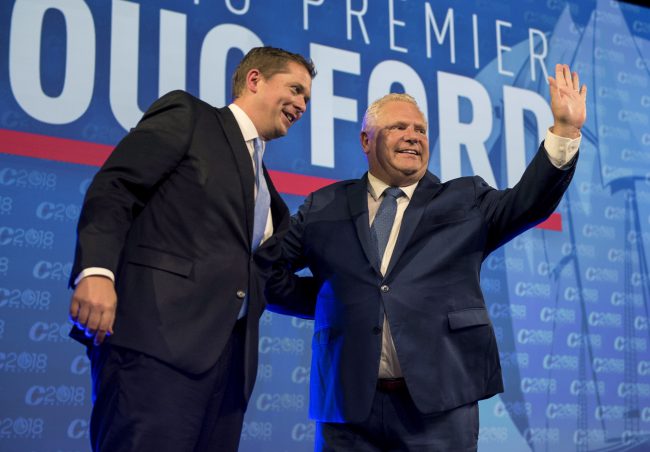Ontario Premier Doug Ford has adjourned Queen’s Park until after the federal election, giving members of provincial Parliament an extra seven weeks before they will return to the legislature for official government business.

But it’s unclear to what extent provincial politicos will use that extra time to lend a hand to their federal cousins in the fall federal election.
READ MORE: Ford government to adjourn Ontario legislature until after federal election
The Ford government moved a motion on Thursday to adjourn the legislature until Oct. 28, 2019. That will see MPPs return to Queen’s Park one week after Canadians go to the polls in what is set to be a fiercely-fought federal campaign.
The decision also comes on the heels of a whirlwind first year for the Ford government, which surged to victory last spring and in the process decimated the Liberals that had been in power for the previous 15 years.
But a report from the Canadian Press earlier in the week cited Abacus Data though as saying their polling suggested 15 per cent of Ontario voters who cast ballots for Ford would now vote for a different party, raising questions about whether potential Ford government involvement in a federal campaign could help or hurt their federal cousins in Andrew Scheer‘s Conservatives.
A second survey done for the Toronto Star by Corbett Communications and released this week also suggested a majority of Ontario voters were “less likely” to vote for Scheer because of the policies of the Ford government, including 21 per cent of those who said they voted Conservative federally in 2015.
WATCH BELOW: Scheer says Trudeau is pitting provinces against each other

“It’s going to be a bit of a tango,” said Tim Powers, vice-chairman of Summa Strategies and managing director of Abacus Data.
Ford said during a press conference on Friday that he isn’t planning to get involved in the federal campaign.
With five months to go until the campaign though, it’s difficult to say whether things could change or if other members of his team will lend a hand.
- Alberta to overhaul municipal rules to include sweeping new powers, municipal political parties
- Canada, U.S., U.K. lay additional sanctions on Iran over attack on Israel
- No more ‘bonjour-hi’? Montreal mayor calls for French only greetings
- Trudeau says ‘good luck’ to Saskatchewan premier in carbon price spat
Provincial and federal political parties are kind of like cousins: related but effectively different families.
However, just like most families, there’s often a lot of going back-and-forth when it comes to the changing of the political seasons.
READ MORE: Conservatives fire volley of TV attack ads at Trudeau saying he betrayed those who voted for him
When Prime Minister Justin Trudeau won the 2015 campaign, he recruited heavily from Ontario Liberal staff working in Queen’s Park for the then-premier, Kathleen Wynne. She has been a frequent sight on the campaign trail, boosting the federal Liberals across the province as part of a bid to unseat Stephen Harper.
“Wynne went all-in, doing more election campaign events for Trudeau than any premier since Bill Davis during Brian Mulroney’s 1984 campaign,” wrote TVO’s Steve Paikin in a column in March 2018 ahead of the provincial election.
And when Wynne was plummeting in the polls, she reportedly turned to the person Trudeau relied on as a “fixer” to lend a hand: his former director of issues management, Zita Astravas, who was at the time chief of staff to Defence Minister Harjit Sajjan.
There’s been similar fluidity between federal and provincial conservatives too.
WATCH BELOW: Trudeau accuses Ford of not hearing people despite stopping cuts

Jenni Byrne, former war room chief for Harper and a prominent figure behind the scenes during his majority government, became principal secretary to Ford after his victory.
Melissa Lantsman, former director of communications to former finance minister Joe Oliver, also joined up with the Ford campaign and ran his war room during the 2018 campaign after running communications for Caroline Mulroney’s leadership campaign.
Those close ties, just a few examples of many, demonstrate the relations between the parties and the ease with which both the parties themselves and their associates can come to each others’ aide.
“It’s no secret that political loyalties and affiliations by party don’t really know any clear jurisdictional boundaries,” said Bob Chant, former senior adviser to former prime minister Brian Mulroney and former Ontario premier Mike Harris.
Chant, currently a senior adviser with Strategy Corp., said while negative polls can be a factor in whether one leader pulls out all the stops to support the other, he doesn’t think the falling polls for Ford will cause Scheer to back away from accepting his support on the campaign trail.
“The only polls that matter are on Election Day.”
WATCH BELOW :Doug Ford ‘letting down Canadians’ by refusing to work with Ottawa, says Trudeau

But Greg MacEachern, vice-president of Proof Strategies and a former political staffer for former Liberal prime minister Paul Martin, noted that Scheer has already built up close public ties with Ford and because of that, runs the risk of getting hit by any dissatisfaction that Ontario voters have with the premier.
“Voters don’t often differentiate between levels of government, especially provincial and federal,” he said, adding that he thinks Scheer also faces potential risk if he isn’t able to build up the same level of name recognition that premiers like Ford and Alberta’s Jason Kenney have with voters.
“Scheer hasn’t broken through the background noise to really define himself. I think that’s where it gets a little bit dangerous for Conservatives,” he said.
Powers also raised the same concern facing Scheer.
“That’s the challenge here, not just in Ontario,” he continued.
“He needs to be seen as a standalone leader, not the little brother to better-known premiers.”




Comments